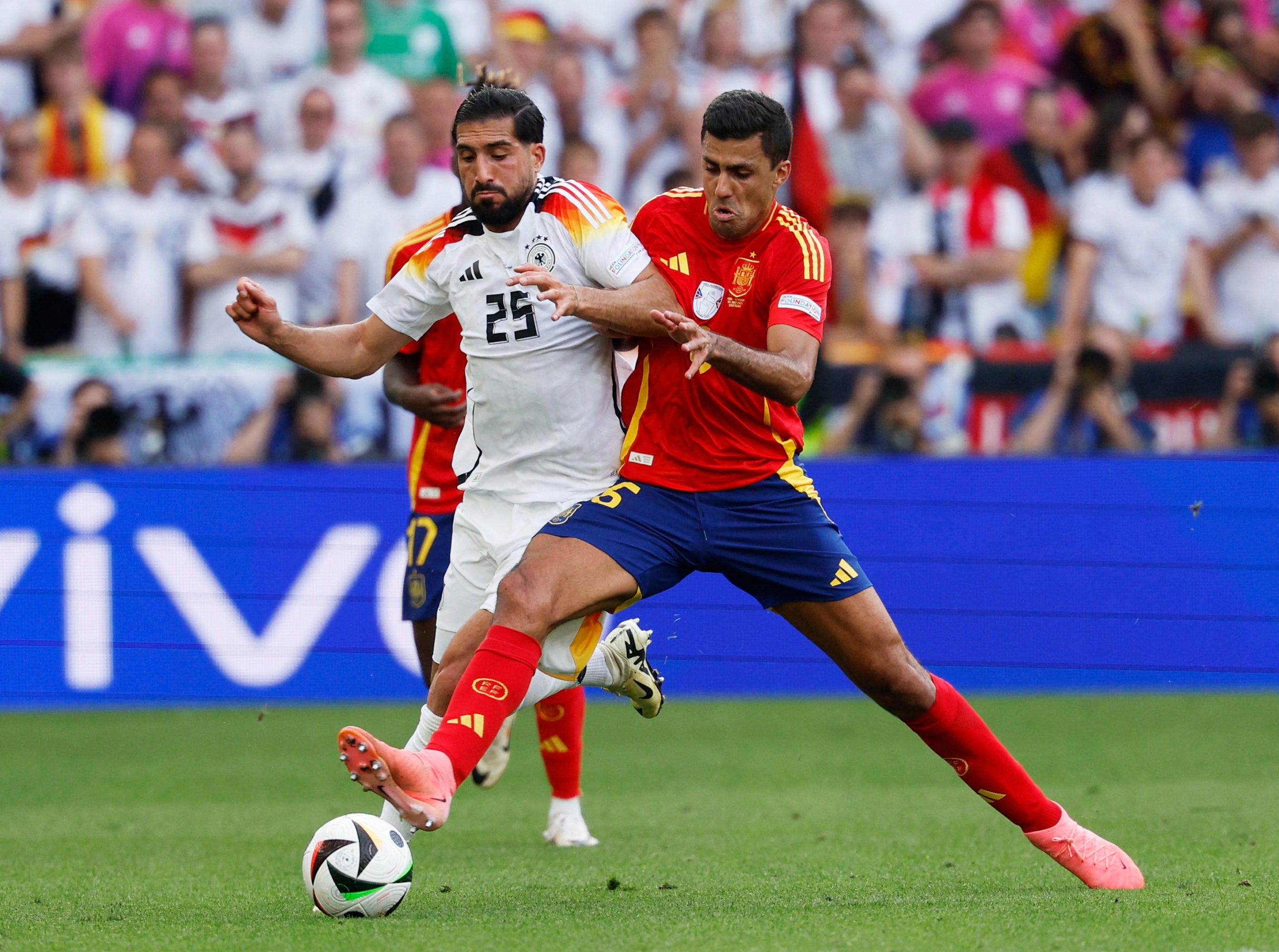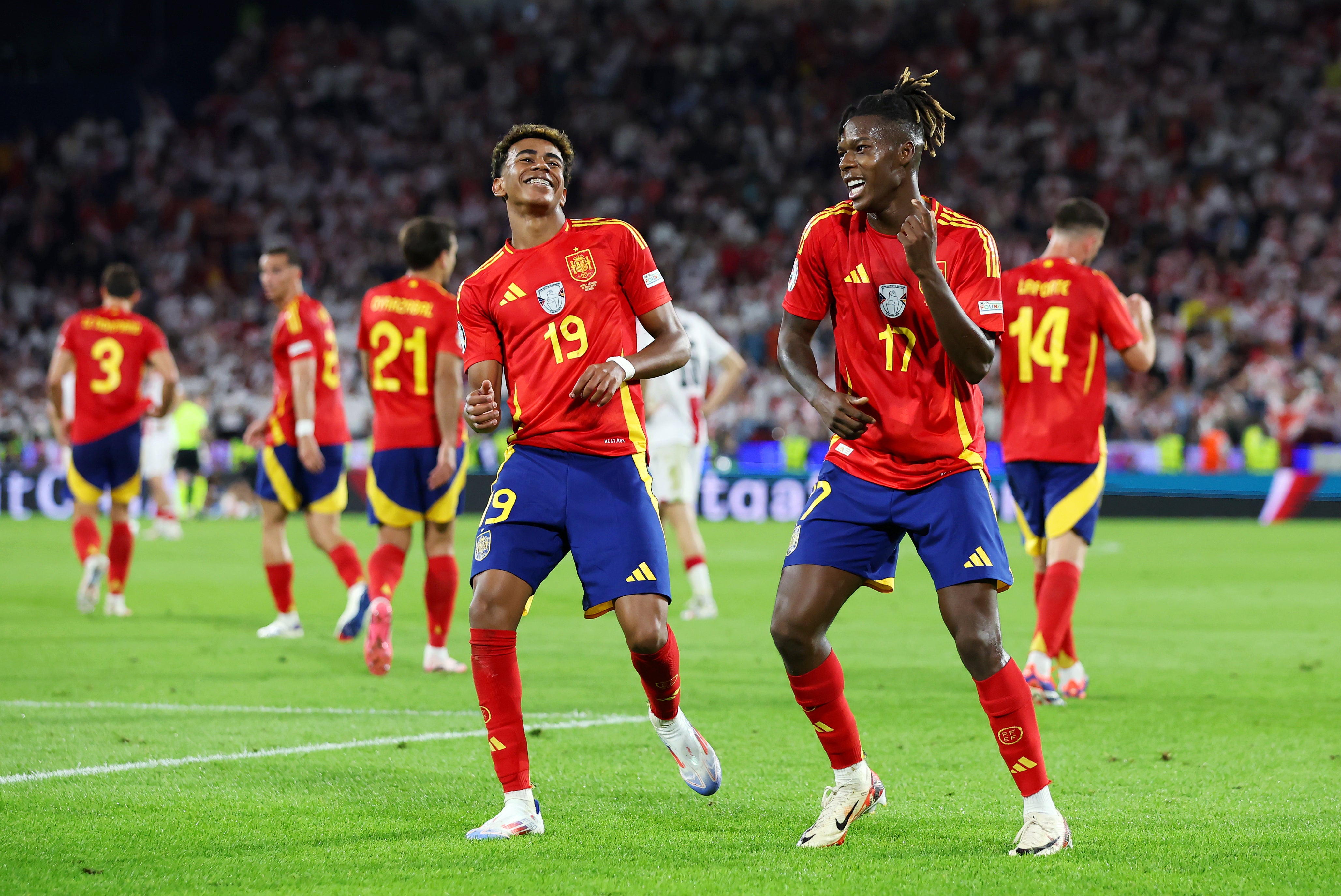The simple idea that made Spain the most dangerous team in Europe
The revitalisation and sharpening of one specific idea has led Luis de la Fuente’s team to the edge of glory, as England await in the Euro 2024 final

Your support helps us to tell the story
From reproductive rights to climate change to Big Tech, The Independent is on the ground when the story is developing. Whether it's investigating the financials of Elon Musk's pro-Trump PAC or producing our latest documentary, 'The A Word', which shines a light on the American women fighting for reproductive rights, we know how important it is to parse out the facts from the messaging.
At such a critical moment in US history, we need reporters on the ground. Your donation allows us to keep sending journalists to speak to both sides of the story.
The Independent is trusted by Americans across the entire political spectrum. And unlike many other quality news outlets, we choose not to lock Americans out of our reporting and analysis with paywalls. We believe quality journalism should be available to everyone, paid for by those who can afford it.
Your support makes all the difference.In Luis de la Fuente’s first international break with Spain back in March 2023, he stopped a training session at moments that the players didn’t expect. It’s an approach that has become familiar now, but was odd for the squad at the time.
One intervention was for goalkeeper Unai Simon to kick it long. Another was to work on set pieces, since De la Fuente’s predecessor Luis Enrique had insisted he “didn’t have time”. These are rudimentarily pragmatic elements that seem to run against Spain’s ideological purism, the pressing-possession that has dominated the game for 16 years, but that was part of the point.
By contrast, Enrique gave long instructional talks with a giant screen after sessions, which began to contribute to a sense of detachment and drift. This was the great frustration with his regime. It had seemed like a vibrant new era with a new generation, but ended up falling to all of the same old flaws Spain have suffered since 2012.
The 2022 World Cup elimination to Morocco was a nadir because of how excessive possession again became a parody with a punchline rather than a knockout blow. The 2008-12 glory era was becoming a burden, having previously been a long-awaited watershed.
This is why Euro 2024 has been so satisfying for those in the country’s football culture. It is not just a return to a major final for the first time since 2012 but the revitalisation of an idea. That idea simply required sharpening.
De la Fuente has done that. That is most obvious in the two exhilaratingly incisive young wingers. They were also part of an overhaul where De la Fuente showed his own edge after an initial 2-0 defeat by Scotland in that March 2023 break. The manager realised some of the ideas weren’t immediately being grasped, so it was time to make grander changes.
The core idea persisted within, even if it had to evolve. That is quite a remarkable thing, especially as Rodri made such a point of putting his foot on the ball in the final moments against France to put Spain back in the final.

The idea has gone through bad results, bad tournaments, and even some bad players. There was a recent period when Spain’s famous youth system looked like it was producing lesser clones of their great technical players rather than proper new talent. No one can say that now after Spain have gone through one of the hardest tournament runs any team has ever had to reach a final.
There is an ominous stat from that, which will do the rounds in the build-up to Sunday’s game at Berlin’s Olympiastadion. Since May 2001, Spanish teams have played non-Spanish teams in 22 major finals across club and international football. There has never been a defeat.
This is really what England are playing on Sunday. They are facing an idea which has amplified a team. It is famously developed on all players coming through the same technical and tactical coaching as children. They are just attuned to that idea. Some in the Spanish camp accept that this squad isn’t yet as individually talented as England, but believe that the system can multiply its abilities.
De la Fuente has been important in another way here, compared to Enrique. While the former Barcelona manager was seen as divisive in a Spanish political context of growing Madrid-Barcelona division, De la Fuente has none of that as a figure who has been more aligned to the Basque country. All of this has already made Spain favourites.
This could even have been the fixture that Gareth Southgate faced in his first final at Euro 2020, since a lesser Spanish side were arguably better than Italy in that semi-final. Spain’s final record is instead what the England manager wants to recreate.

If England win, it would be their equivalent of Spain’s Euro 2008, finally translating long-term club success into international triumph. The problem, to almost bring things full circle, is that they are facing a Spanish side that has a similar feel to 2008.
It is striking to watch their games from that tournament now, which sparked a glory era where Spain became renowned for ultra-control. That actually ended up as such a level of control that it led to conversations in 2010 and especially 2012 over whether the team was “boring”.
There was none of that in 2008. It was all sharp-angled passes from Andres Iniesta and Xavi Hernandez, for sleek runs and finishes from Fernando Torres and David Villa. The play was so smooth, and almost foreshadowed the flow of this 2024 team. There simply wasn’t the same force as now.
That directness reflects the team’s progress, which can be tracked through the coaches. For all that Spanish international managers are seen as fitting into the core idea rather than having any wider influence, most are credited with putting their own individual imprint on the ideology.
For Euro 2008, Luis Aragones finally pushed the button on all of the Barcelona passers, who were described as “los bajitos” – “the little lads”. Vicente del Bosque, who won the 2010 World Cup and Euro 2012, was seen as introducing the double-pivot. That was after opposition sides began to adapt to Spanish possession to try to hit them on the counter. There had been a glass jaw. Enrique realised the need to introduce “intensity”. De la Fuente saw something was missing from that, and is now giving Spain proper wingers.

Those wide players finally offer the release that the team so badly required. As a result, Spain haven’t got into these existential crises about their passing identity, which the successive World Cup eliminations to Russia and Morocco represented. They don’t need to wait for the gaps any more. They can just unleash Lamine Yamal and Nico Williams to force those gaps themselves.
The manner in which the duo stretch the pitch has meant there are more gaps in their own team, which has ensured they look more fallible than “the great Spain”. It’s also true there aren’t the same number of senior pros as 2008-12. Xavi, Iniesta, Carlos Puyol, Sergio Ramos and – later – Sergio Busquets and Xabi Alonso could just take complete command of a game. Rodri now almost exclusively performs that role for Spain, which is why it is so important that he has gone up another level as maybe the game’s most outstanding midfielder. In front of him, with Pedri’s injury, Dani Olmo offers a distinctive perception that Spain didn’t previously have. The pair have been among the players of the tournament, along with Yamal and Williams.
One disadvantage for Spain is their relative inexperience. Southgate is preparing for his second final. This Spanish squad are going for their first.

The team evidently isn’t yet complete, so will have vulnerabilities to exploit. And yet, look at their route to Berlin. They’ve already won six games from six, which no previous European champion has ever done. Brazil 2002 are in fact the only team in history to have won all their games in a seven-game tournament. Spain can emulate that, but the run has been so much harder.
The squad are talking about how they’ve faced all the “giants” in Italy, Croatia, France, Germany and now England.
They aren’t just names, either. Those teams represent the defending champions, the 2018 World Cup finalists, the 2018 World Cup winners and 2022 finalists, the vibrant hosts and the Euro 2020 finalists.
Spain could have the “perfect” tournament. But De la Fuente has played down that idea and comparisons between his players and the 2008 Spain squad. Instead, he has talked about having a “development plan” that is “on track”. He is just persevering with an idea.



Join our commenting forum
Join thought-provoking conversations, follow other Independent readers and see their replies
Comments